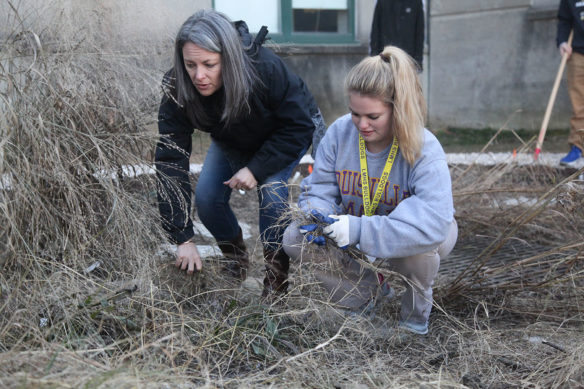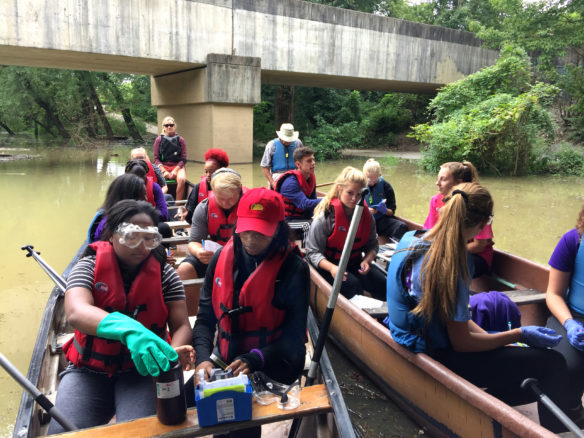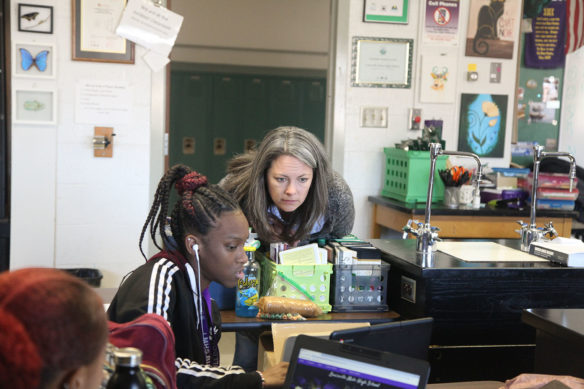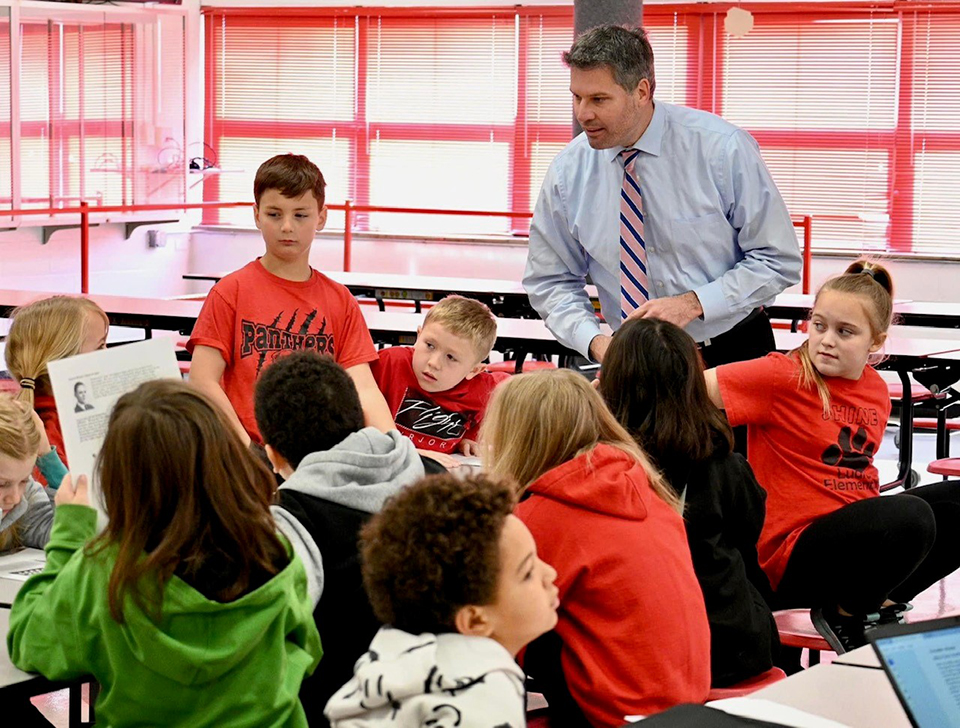
Students in Angela Page’s creek class at Louisville Male High School (Jefferson County) take to Beargrass Creek in canoes as they perform water quality tests on the Ohio River tributary. Page’s class exposes students to work in chemistry, forestry, botany and other disciplines. Students in Angela Page’s creek class take to Beargrass Creek in canoes as they perform water quality tests on the Ohio River tributary. Page’s class exposes students to work in chemistry, forestry, botany and other disciplines.
Photo submitted
- Students visit the Ohio River and Beargrass Creek in Louisville twice a week to practice chemistry, botany, forestry and other disciplines.
- The teacher said similar studies could be done by teachers in any location.
By Mike Marsee
mike.marsee@education.ky.gov
Angela Page’s students are gaining a new understanding of the waters that shape their lives.
The city in which they live would not exist were it not for the Ohio River, and Page and the students in one of her classes at Louisville Male High School (Jefferson County) have been spending time on and along the Ohio and Beargrass Creek just outside downtown Louisville.
They’re studying water quality and related issues in an innovative class that Page created. This is the second year for the class that is listed in the school’s course offerings as Advanced Ecology, but has come to be known as the creek class.
“I’m still building it as I’m flying it,” Page said. “There are a lot of things I learned last year.”
It is being built largely without textbooks and assessments, with an emphasis on field study and an eye toward building each year on the work of the previous year’s class. Students in the double-blocked class spend two days a week afield, sometimes studying the water from the creek or river bank and sometimes venturing out in canoes.
“This year I’m introducing them to as many different field techniques as I can,” Page said. “For instance, we spent several weeks on water chemistry and why it’s important, assessing the habitats of streams, doing plastics surveys.”
The creek class was the brainchild of Page, who is in her 14th year of teaching science at Male and her third year of teaching ecology. She also teaches three Ecology I classes and one AP Environmental Science course.
She traveled last summer to China, where she and a colleague spent 5 1/2 weeks teaching water quality to students there. She said it was through that work that she came to realize the importance of teaching about water quality at home.
“As much as I like to travel, we could always use more information here about our waterways,” she said. “It’s just a shame that a lot of curriculum is based out of Chesapeake Bay when we have a lot of our own water quality issues here.
“Everyone lives in a watershed, so this translates to everywhere you live in the world.”

Students in Angela Page’s creek class take to Beargrass Creek in canoes as they perform water quality tests on the Ohio River tributary. Page’s class exposes students to work in chemistry, forestry, botany and other disciplines.
Photo submitted
Page said the class isn’t for everybody, but it could be for anybody.
“I think it’s for any kid who’s not scared to go outside, who learns by being active,” she said. “I’ve had an amazing mixture of kids that have shown interest in the class, from people who are strong in science to people who are crazy about the outdoors. I’ve got people who want to be foresters or maybe work in the industry, to people who don’t want to do that but like the hands-on approach.
“It’s not a class that’s going to pigeonhole a particular group of people.”
She said the class exposes students to work in chemistry, forestry, botany and other disciplines, and she said the skills they learn could help them in a number of fields they might pursue.
“It could be in engineering, it could be in biology, forestry, environmental chemistry, urban planning,” Page said.
Katie Norman, a junior, said what she has learned in the class might spur her to work with wildlife.
“I wanted to be a veterinarian, but now I definitely think that I want to work with wildlife,” Norman said. “We just looked at an article about how fish get plastic from the water into their intestines and bloodstream. I just think it’s so interesting that one thing that we can do has such a major effect.”
Some of the students’ work includes performing chemistry tests to determine the health and quality of the water, and monitoring the levels of plastics in the water and studying its impact.
“This has opened my eyes to pollution and how bad it is, how big of a problem it is,” senior Alexis Downs said. “People don’t realize and they just litter, and they don’t realize the impact it has on the earth.”
“They’re very interested in plastics, We have two years of photographic evidence of plastic islands that have formed in Beargrass Creek and the types of animals that are living in and around them and using them,” Page said.
Students also have worked with foresters, taking inventory of trees near the water and doing a comparative study of two stands of trees.
“When I have my own house one day, I know what to plant and what not to plant and how to keep invasive species from growing,” Downs said.

Angela Page helps student Ariah Bradford with her work in Page’s classroom at Louisville Male High School (Jefferson County). Students in the creek class will focus on independent research projects based on their studies, and Page said those projects could provide the foundation for work by next year’s class.
Photo by Megan Gross, Nov. 28, 2007
Students in last year’s class worked on seven different projects – some of them at the same time – though not everything went as planned. An experiment that was part of a study of erosion on the banks of Beargrass Creek began early in the school year, but it was lost to a February flood that washed out the entire stream bank.
“That was a character-builder, because science doesn’t just happen in a semester,” Page said. “One of the first things I tell them in this class is you’re going to get frustrated. The frustration is good, because it teaches you to work through it, persevere, be stronger. Things aren’t going to happen the way you plan them, and that’s OK. It’s how you manage yourself when things don’t go your way that is going to build you.”
Students will focus on independent research projects in the spring semester based on their studies, and Page said those projects could well provide the foundation for the work next year’s students will do.
“That’s what I’m hoping for,” she said. “Last year’s class pictures have led to this year’s work.”
And beginning next year, Ecology I will be a prerequisite for the creek class.
“I can get all of that knowledge, all of that information into them this year so we can hit the ground running with research next year,” Page said.
Field study and experiences – often through partnerships with local organizations – have become a hallmark of all of Page’s classes. Students in last year’s Ecology I classes – some of whom are in the creek class this year – began work on a rain garden outside the school with the help of a grant from the Metropolitan Sewer District. That rain garden was completed by this year’s students earlier this month.
Her students also have planted trees to replace some of those that have been lost as the campus was developed, they are maintaining a landscape feature planted in front of the school as a sound barrier, they are presenting to the Louisville Nature Center on their design for a natural play area, and they are working with the Louisville Botanical Gardens to become guides there.
“I’m not an expert in anything, but I can find the people that I need to help my kids be successful, and I think that’s a really important thing for teachers to acknowledge,” Page said.
MORE INFO …
Angela Page angela.page@jefferson.kyschools.us



Leave A Comment